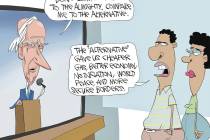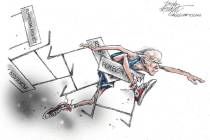Hitting rogue websites where it hurts
The Ultimate Fighting Championship is known for providing world-class entertainment and athletics. What we may be lesser known for, however, is our desire to fight real-world criminal activity.
No, these criminals aren't lurking in the dark corners of alleys. Instead, they're skulking behind their computer screens. Foreign criminal networks are abusing the Internet with the illegal sale of counterfeit products such as electronics, prescription drugs, clothing and -- in our case -- illicit downloads and streaming of our matches.
One of the worst things about this hidden problem is the American consumer is being snookered. These criminal sites look legitimate. Deceptive and sophisticated, rogue websites carry legitimate-looking logos and seals of approval.
It's often almost impossible to know what is real and what is fake ... often until it is too late.
What harm is done by these sites? Foreign criminal websites cost legitimate U.S. businesses more than $200 billion a year, siphoning off American jobs, hurting businesses and dampening our economy. Some websites sell fake prescription drugs that have sickened innocent people and resulted in death. Others sell defective electronics that don't work properly, are shoddy and create fire hazards. Websites that offer illegal content streaming and downloads, furthermore, have been known to expose consumers to malware and facilitate identity theft.
Like other American sports and entertainment companies (such as the NFL, NBA, Major League Baseball and ESPN), UFC creates thousands of jobs, adds hundreds of millions of dollars to a struggling economy, and -- specifically -- brings many visitors to Nevada who would not otherwise come here and spend their money. All of this is evidenced by an independent analysis that we invited in 2009 to report on the UFC's economic and fiscal contributions to Nevada.
The UFC itself is an example of American innovation. The Fertitta brothers, who are Las Vegas natives, along with their friend, Dana White, co-founded today's UFC by rescuing a dying company from bankruptcy. They cleaned up the sport by inviting clear, enforceable regulation of fighting events, put their own livelihoods on the line and created a new market (with thousands of jobs) where none existed prior. That is exactly the kind of entrepreneurial engine that our country needs, especially now.
All told, UFC's contribution to the economy is well more than $300 million each year, but as with so many American businesses and employers, the UFC's economic activity, its success, survival and contributions depend in large measure on the rule of law, clear protections for innovation and investments -- investments in people, investments in products, investments in intellectual property. When thieves steal broadcasts from the UFC, the NBA or the NFL -- broadcasts that law-abiding citizens pay for -- and then share them with impunity over the Internet -- it undermines UFC's investment, its profits and its ability to employ people and to help grow the economy.
Stealing is not innovation, contrary to what some commentators might imply. Stealing is stealing, and it hurts innovators, it hurts the economy, it kills jobs and it hurts Las Vegas and America.
One of the most fundamental roles of government is to protect its citizens from theft and fraud. Illegal sites operated in other countries are outside the reach of U.S. law enforcement agencies. New legislation would provide the tools to protect Americans from these criminals by cutting them off from the American market in the same accepted and effective way we cut off websites that exploit children or distribute malware.
Thanks to the support of Nevada's own Sen. Harry Reid, the U.S. Senate is working toward passage of the Protect IP Act. A procedural vote scheduled for this week was cancelled so Sen. Reid can enter more negotiations with House leaders and their bill, the Stop Online Piracy Act.
When it comes to Internet thievery, some want to throw up their hands and admit defeat. Others argue that the Internet is better without rules. Both these arguments are wrong and shortsighted. There is a better way, and it is within our reach.
Lawrence Epstein is executive vice president and general counsel for the Ultimate Fighting Championship. He writes from Las Vegas.























